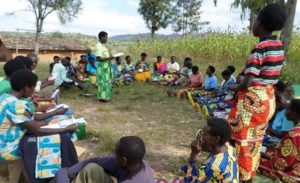DUHAMIC-ADRI
DUHAMIC-ADRI
Rwanda
Contact person: Vestine Mukandayisenga
Email: mukandayisenga.vestine@duhamic.org.rw
Website: http://www.duhamic.org.rw/
It will be hard and impossible to trust someone you don’t know very well while dealing with money. We are at the same level, we practice agriculture and other off farm activities at nearby, we have internal regulations, we elect group leaders ourselves, we have saving account in nearby microfinance our money is secured and we trust each other. That is the source of power for our saving group.
Said by Claudine UWAMAHORO, ABARIKUMWE Saving Group President working in Burega Sector Rulindo District/RWANDA. Saving Group mentored by DUHAMIC-ADRI/RWANDA
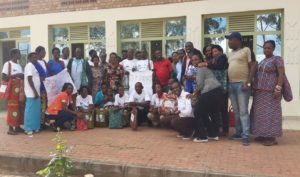
Challenge
One of the main challenges that rural farmers in Rwanda are faced with is the decrease (or absence) of income during low-harvest periods. This occur mainly because their income is not diversified and depends almost exclusively on agricultural activities. In this context, DUHAMIC works with VSLA groups. For being effective, these groups need to be composed by members who trust each other with part of their income. Unfortunately, this is not always the case and DUHAMIC provides farmers with strategies that can help increasing trust among VSLA members.
For more information about DUHAMIC’s work and the way they tackle the mentioned challenges, please watch the following video that was prepared for the E-Motive exchange: https://oxfam.box.com/s/6h0w9lc1rzpehm9tolf9sr7iy55fjky7
Solution and innovation
- Creation of trust among VSLA members
DUHAMIC conducts a training on VSLA/ISLG/SILC methodologies that provide members with different tools for increasing or creating trust among them. Those trainings include saving methodologies which have different sessions on saving groups creation, saving group meetings, saving by-laws, saving by-goals, saving groups cycle and share outs. They also trained on CFI (Community Finance Initiative) where VSLA members learn saving, budgeting, saving goals, loans and loans management and banking services.
To create trust, DUHAMIC pays special attention to the way in which the groups are formed. Self-selection of members is important to ensure that they all know each other and evaluate their personal qualities (for example, have a reputation for integrity, honesty and reliability; have a cooperative personality; be able to repay loans on time; attend all meetings; among others). Additionally, all members should participate in the formulation of the constitution and elect (democratically) the leaders of the group. Another important practice from DUHAMIC is to have a specific seating arrangement for the VSLA meetings that allows members to see clearly what is happening and ensure that all transactions happen in order and are visible for all members.
- Diversification of income through off-farming activities
For helping farmers diversify their source of income, DUHAMIC-ADRI uses GALS tools for Value Chain Development (VCD) and for identifying different off-farming activities. Some examples are livestock keeping; animal feeds selling; hairdressing; handcrafts; among other activities. The following paragraphs contain a description of the way in which some of the main GALS tools are used for this purpose.
- Market Map
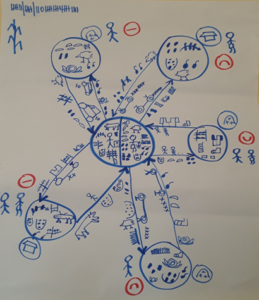 This tool is used to identify profitable markets. For this, an evaluation is conducted on different aspects like: how do farmers go to the market; what are the products offered; what are the prices of the products; transportation costs; etc. This analysis includes also an evaluation of the gender dynamics that are present on that specific value chain. After using this tool, the farmers can make an informed decision about investing or initiating an income generating activity on that market. They can also easily identify advantages and disadvantages of different markets.
This tool is used to identify profitable markets. For this, an evaluation is conducted on different aspects like: how do farmers go to the market; what are the products offered; what are the prices of the products; transportation costs; etc. This analysis includes also an evaluation of the gender dynamics that are present on that specific value chain. After using this tool, the farmers can make an informed decision about investing or initiating an income generating activity on that market. They can also easily identify advantages and disadvantages of different markets.
- Production challenge action tree
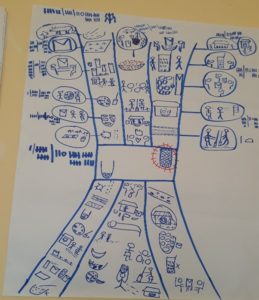 This tool helps female, male and young farmers to identify the main challenges that can be faced on agricultural productivity, market access and nutrition challenges. The tools helps to find solutions that are specific to each of the mentioned groups and topics.With the use of this tool, farmers develop a specific action plan that tackles the identified challenges. This planning should normally be adjusted season by season and linked to the Vision Road Journey. In that way, the Production Challenge Action Tree contributes to the household/ group/ cooperative levels.One example of the application of this too the case of KOPABU Cooperative, the main challenge in maize value was to find enough capital/investment. The farmers engaged to put efforts in working with saving groups to get money to buy seeds and other agri-equipment with the vision to increase production and reach a profitable market. The saving and lending groups are channels to diversify the source of income and initiate other income generating activities, smallholder farmers could access on loans for agriculture investment.
This tool helps female, male and young farmers to identify the main challenges that can be faced on agricultural productivity, market access and nutrition challenges. The tools helps to find solutions that are specific to each of the mentioned groups and topics.With the use of this tool, farmers develop a specific action plan that tackles the identified challenges. This planning should normally be adjusted season by season and linked to the Vision Road Journey. In that way, the Production Challenge Action Tree contributes to the household/ group/ cooperative levels.One example of the application of this too the case of KOPABU Cooperative, the main challenge in maize value was to find enough capital/investment. The farmers engaged to put efforts in working with saving groups to get money to buy seeds and other agri-equipment with the vision to increase production and reach a profitable market. The saving and lending groups are channels to diversify the source of income and initiate other income generating activities, smallholder farmers could access on loans for agriculture investment.
- Win-win tree
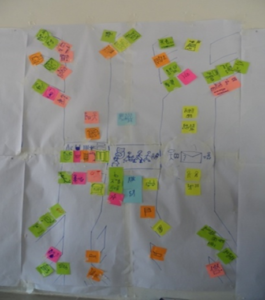
The aim of this tool is to identify the challenges that farmers face in the value chain but that cannot be solved at that level and need the involvement of other relevant stakeholders. The challenges are defined in terms of production, gender and market level.
The application of the tool starts by mapping the stakeholders involved in the value chain and inviting them for negotiation.
All the stakeholders together analyze the challenges and its root causes and propose different solutions. An action plan is developed in order to tackle the identified challenges. Each stakeholder is assigned to specific tasks and a timeline in which those tasks should be executed. A team is selected to follow-up on the execution of the action plan.
Income source diversification is a result of all aforementioned tools and an action for the Vision Road Journey tool where women and men, children need to work for achieving visions.
For more information, please watch the following video that was prepared by DUHAMIC for the E-Motive exchange: https://oxfam.box.com/s/cpzxfy6lku7ipesxajzbgo56wldh4yt7
Results
Impact created after the trainings and activities to build more trust:
- DUHAMIC-ADRI worked with above 6,133 saving groups with 20-30 members per group with 73% females (DUHAMIC-ADRI project reports 2012- 2020). Women-led saving groups are more successful, sustainable and trusted by their members than men led saving groups;
- VSLA members are motivated by achievements from the use of requested small loans: initiating farm and off farm income generating activities, payment of school fees and materials for their children, meeting other basic needs and addressing other family issues;
- VSLA members are linked with finance institutions to access on loans as a group so that they can invest in profitable businesses and they are able to payback received loans, this explain the trust among themselves and the trust for the microfinance to give them loans;
- Regular mentorship by project staff from saving cycle of one year to another is a success for VSLA.
The impact /result on the off-farming activities and market access
- VSLA members themselves request loans in their groups and do payback. Those small loans are used in different activities including and not limited to off-farming activities like handcrafts, selling mobile money services, retailers/Boutique, hairdressing, clothes selling etc.
- Markets are accessible at local level in country wide.
- VSLA members do saving and access on small loans in groups and they have opened bank accounts to be able to work with microfinance.
- The requested loans are used for profitable businesses including off-farm activities to diversify the sources of incomes;
- Mature VSLA initiate off-farming activities that are benefiting the whole group and the benefits are shared in share-out meetings each year.
